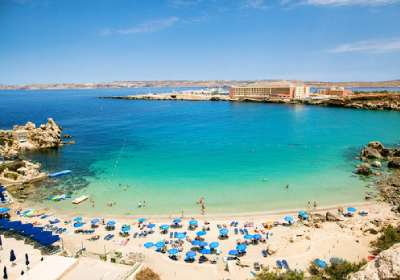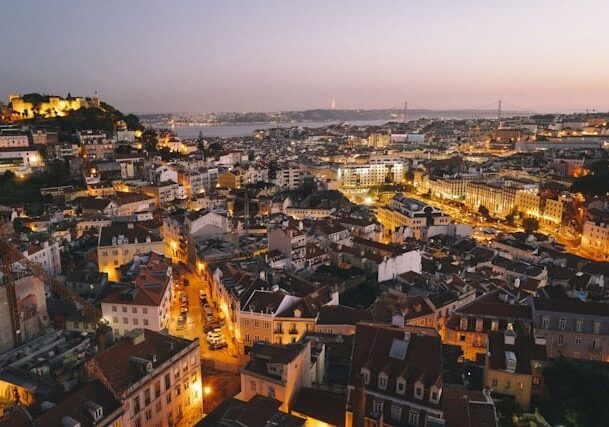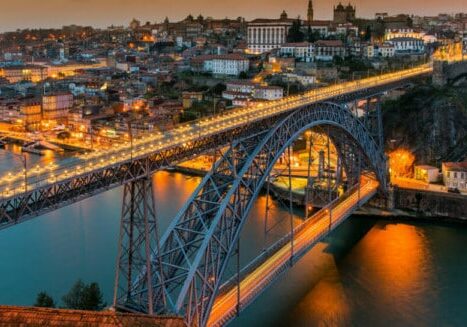Updated: August 22, 2025
When deciding on a dream European destination to retire, Malta vs Portugal are often compared. They are two of the most sought-after retirement destinations globally, and it’s easy to see why. Both offer sunny Mediterranean climates, a high standard of living, and the perks of EU membership, but they cater to different lifestyle preferences and budgets.
This article offers an in-depth comparison between the two countries, designed to help you explore the unique offerings of Malta and Portugal and determine which aligns best with your retirement aspirations.
We will delve into key comparisons, including the cost of living, healthcare systems, safety, and lifestyle, and visa and residency requirements, providing you with the essential information to make an informed decision for your golden years.
Retirement Visa and Residency Programs: Malta vs Portugal
When planning your dream retirement in Europe, securing the right residency permit is a crucial first step. You will need to assess your own circumstances to see which visas you qualify for.
Both Malta and Portugal offer attractive visa pathways for retirees, but their requirements, costs, and benefits differ. This section will walk you through the main retirement visa options and residency programs in each country so you can decide which best suits your lifestyle and financial goals.
Portugal D7 Visa (Passive Income Visa) for retirees
The Portugal D7 Visa, often referred to as the Passive Income Visa, is a highly attractive residency option for non-European Union (EU)/European Economic Area (EEA) and non-Swiss citizens.
It is specifically designed for individuals who can demonstrate a stable and consistent source of passive income from outside Portugal, making it ideal for pensioners or those with income from rental properties, investment dividends, or royalties. Introduced in 2007, the D7 Visa allows holders to reside in Portugal without needing to find a job in Portugal.
Eligibility requirements

- Stable passive income: The primary requirement is to demonstrate a steady and sufficient source of passive income. This can include pensions, rental income, dividends, intellectual property royalties, or other non-employment-related earnings.
- Minimum income requirement: As of 2025, the minimum income requirement for a single applicant is €870 per month, or €10,440 per year (Portuguese minimum wage). This increases by 50 percent for a spouse or dependent parent, and for each dependent child, an additional 30 percent is required.
- Proof of accommodation: Applicants must provide evidence of suitable long-term accommodation in Portugal, such as a rental agreement (typically for 12 months) or property ownership documents.
- Health insurance: Valid private health insurance covering medical needs in Portugal is required.
- Criminal record check: A clean criminal record from the applicant’s home country or recent country of residence is required to ensure good character.
Application process overview
The D7 Visa application typically involves the following steps:
- Gather your documentation: You will need to compile all necessary documents according to Portuguese consular requirements. This includes proof of income, accommodation, health insurance, and a criminal record certificate.
- Submit your application: Submit your completed application form and all supporting documents to the Portuguese Consulate or Embassy in your home country or country of legal residence.
- Attend an interview: You may be required to attend an interview at the consulate to discuss your application and clarify any details.
- Processing time: Processing times can vary, generally ranging from several weeks to a few months.
- Receive visa and apply for a residency permit: If your application is approved, you will receive a D7 Visa allowing you to enter Portugal. The D7 Visa is initially issued for two years and can be renewed. Upon arrival, you must schedule an appointment with the Immigration and Borders Service (AIMA Portugal) to get your residency permit.
Path to permanent residency and citizenship
The D7 Visa provides a pathway to permanent residency in Portugal after five years of legal residence. Individuals may also be eligible to apply for Portuguese citizenship, provided they meet language proficiency requirements (basic Portuguese) and other naturalization criteria.
Note: In June 2025, a proposal was made to increase the minimum residency requirement for Portuguese citizenship from five to ten years (or seven years for CPLP nationals). This is still a draft proposal and not yet law. Read the latest updates through Global Citizen Solutions.
Other Portuguese visa options for retirees
While the D7 is the primary passive income visa for retirees, it’s worth noting that Portugal also offers a host of other visa types like the D2 Visa for entrepreneurs, Portugal HQA Visa for highly qualified professionals, or the Portugal Golden Visa for investors.
However, they are not specifically tailored for retirement based on passive income and will have other requirements that need to be met.
Malta Retirement Programme (MRP) and Malta Permanent Residence Programme (MPRP)
Malta offers two unique pathways to residency for retirement and to permanently live in the country. These routes are the Malta Retirement Programme (MRP) and the Malta Permanent Residence Programme (MPRP).
Malta Retirement Programme (MRP)

It’s particularly appealing for its favorable tax benefits and also offers Schengen Zone access for up to 90 days within a 180-day period.
To qualify for the MRP, applicants must meet the following conditions:
- Pension income: At least 75 percent of your income must come from a pension.
- No employment: Applicants cannot be employed in Malta, though they may hold non-executive positions.
- Property requirement: As your primary residence, you must either purchase a residential property with a minimum value of €275,000 in Malta (or €220,000 in Gozo/South Malta), or rent a property with a minimum annual rent of €9,600 in Malta (or €8,750 in Gozo/South Malta).
- Minimum stay and tax residency: You will need to spend an average of at least 90 days per year in Malta and cannot stay in any other country for more than 183 days in any given calendar year, effectively making you a tax resident in Malta.
- A clean criminal record certificate
- Private health insurance
A significant draw of the MRP is the flat tax rate of 15 percent on foreign income and pensions remitted to Malta. A minimum annual tax of €7,500 for the main beneficiary and €500 for each dependent applies.
Malta Permanent Residence Programme (MPRP)
The Malta Permanent Residence Programme (MPRP) is a residency-by-investment program offering permanent residence in Malta to non-EU/EEA/Swiss nationals. Unlike the Malta Retirement Programme, it focuses on investment rather than passive income, and has no minimum stay requirement in Malta.
There are two ways to qualify for the MPRP, namely:
- Purchase a property with a minimum value of €375,000 in Malta or Gozo and make a €30,000 government contribution, or
- Rent a property for a minimum annual rent of €14,000 in Malta or Gozo and make a €60,000 government contribution
Other requirements include:
- A one-time donation of €2,000 to a local philanthropic, cultural, scientific, artistic, sport, or animal welfare NGO
- A non-refundable administrative fee of €50,000 is required (plus an additional €10,000 per dependent)
- Possession of capital assets of at least €500,000, with a minimum of €150,000 in financial assets (or capital assets of at least €650,000, with €75,000 in financial assets).
- Private health insurance
- A clean criminal record
Key differences between the MRP and MPRP
When comparing the two pathways, it’s clear that the Malta Retirement Programme is for retirees with a pension as their main income. Other key characteristics of the MRP are the tax benefits (low tax rate on foreign income brought into Malta) and the requirement to spend an average of 90 days per year in the country. Property requirements are also at a lower threshold.
The Malta Permanent Residence Programme is an investment-based program for non-EU nationals and does not specifically cater to retirees earning a pension. It requires a more significant financial contribution but grants permanent residency with no minimum stay requirement in Malta. However, it doesn’t offer the same direct tax benefits as the MRP.
Portugal vs Malta head-to-head: Visa requirements and flexibility
Criteria | Portugal D7 Visa | Malta MRP | Malta MPRP |
Minimum Passive Income | €870 per month for single applicant | Pension must be greater than 75 percent of income remitted | No minimum income (but requires capital asset proof) |
Property Requirement | Accommodation proof required (no minimum cost) | Buy from €275,000 or rent from €9,600 per year | Buy from €375,000 or rent from €14,000 per year |
Tax Advantages | Tax benefits under the Tax Incentive for Scientific Research and Innovation regime possible | 15 percent flat tax on foreign income | Standard Maltese tax rates |
Path to Citizenship | Eligible after five years | Not directly through this program | Not directly through this program |
Physical Presence | Must live in Portugal | Must average 90 days per year over five years | No physical presence required |
Family Inclusion | Spouse and dependents allowed | Spouse and dependents allowed | Up to four generations can be included |
Climate and Lifestyle in Portugal vs Malta
One of the major factors when deciding between retiring in Portugal vs Malta is the type of lifestyle that each country can offer you. While Portugal and Malta are similar in many ways, they each have their own unique personalities and atmospheres.
In this section, we’ll provide a brief overview of the pros and cons of living in each country and explore key climate and lifestyle characteristics in more detail.
Pros and cons of living in Portugal
Pros of retiring to Portugal:
- Affordable cost of living, allowing retirees to stretch their budget
- Beautiful scenery, with stunning beaches, lush green spaces, and charming coastal towns
- Warm climate, with over 300 days of sun
- High English proficiency among locals
- Excellent healthcare and education systems
- High level of safety, with low crime rates (seventh safest country in the world)
- Excellent cuisine, with flavors from around the world
Cons of retiring to Portugal:
- Rising living costs in popular tourist destinations
- Slow Portuguese bureaucracy can be challenging
- Language barriers further way from tourist areas
- Crowded areas during peak tourist seasons
Pros and cons of living in Malta
Pros of retiring to Malta:
- One of the safest European countries
- Living costs are relatively low compared to other popular European retirement destinations.
- A pleasant Mediterranean climate, very similar to Portugal, though slightly warmer and drier
- Thriving expat community
- The language of business is English, making it easier to settle in.
Cons of retiring to Malta:
- Limited green spaces and parks on the island
- Summers can be hot and humid.
- Beaches can be crowded, especially during peak seasons.
Weather patterns and seasons
Portugal offers a diverse climate that changes from north to south. The north is cooler and wetter, while the south, especially the Algarve, enjoys long, sunny summers and mild winters. Lisbon tends to stay moderate year-round, while the inland regions can get hot in summer and chilly in winter.
Malta has a classic Mediterranean climate with hot, dry summers and mild winters. Summers can be very hot, with high humidity making it feel warmer. Winters are mild and short, though occasional storms bring brief heavy rain.
Cultural immersion and language

Learning Portuguese, the official language, is highly recommended for true immersion and everyday life, though English is widely spoken in major cities and tourist areas. Portugal ranks sixth on the EF English Proficiency Index.
Malta offers a unique mix of European and North African influences, seen in its food, like rabbit stew and pastizzi (savory pastry) spiced with Mediterranean and Arabic flavors.
A big plus is that English is an official language, making daily life and integration easier for many retirees, while learning Maltese culture and language still adds a more enriching experience.
Outdoor activities and recreation
Portugal is a paradise for outdoor lovers. Adventurous retirees can surf famous waves in Nazaré, hike the Rota Vicentina’s coastal trails, or explore Peneda-Gerês National Park.
The Algarve is perfect for kayaking through sea caves (like the famous Benagil Cave) or simply relaxing on any of the stunning beaches. Wine lovers will adore a river cruise through the Douro Valley.
Malta excels in water-based activities given its crystal-clear Mediterranean waters. Scuba diving and snorkeling are popular, showcasing vibrant marine life and fascinating underwater wrecks, like the famous Um El Faroud, a Libyan oil tanker.
Boat tours around the main island and to the charming sister island of Gozo, including the iconic Blue Lagoon, are highly recommended. Gozo also offers scenic hiking trails for those who prefer land-based exploration.
Expat communities and social integration
Portugal offers retirees thriving expat communities, especially in Lisbon and the Algarve. There are countless social groups, language exchanges, and cultural events that make meeting people easy. Many expats find it straightforward to integrate with the locals, particularly if they learn some Portuguese.
Malta has a smaller but close-knit expat scene. Its compact size and English-speaking environment make connecting with locals and other expats simple. Government initiatives and active community groups also help newcomers feel at home quickly.
Cost of Living Comparison: Portugal vs Malta for Retirees
The cost of living is a crucial factor when deciding where to spend your golden years.
While both Portugal and Malta offer a generally affordable lifestyle compared to many other European countries or North America, there are noticeable differences, particularly in housing, that can impact your budget.
Let’s unpack the costs you can expect if retiring to Malta compared to Portugal.
Housing costs: Renting and buying property
While both countries offer stunning housing options, property in Portugal is more affordable than Malta, due to Malta’s limited space and high population density.
Housing costs in Portugal average €1,870 per square meter, but vary significantly by region. So, it’s a good idea to search around for a location that meets both your budget and your lifestyle goals.
Portugal offers significant savings if you choose areas outside Lisbon, Porto, or the Algarve. The interior and central regions are particularly attractive for budget-conscious retirees.
Here are the prices you can expect to pay for property per square meter in each region in Portugal (Source: Confidencial Imobiliário):
- Lisbon Metropolitan Area: €4,935
- Porto Metropolitan Area: €3,937
- Northern Portugal: €1,903
- Central Portugal: €2,098>
- Alentejo: €3,181>
- Algarve: €4,385
While buying property in Portugal is an excellent financial investment due to its fast appreciation, strong yields, and high demand, you may want to rent property in Portugal before committing to a big purchase.
If so, the average monthly rental costs in Portugal are (source: Numbeo):
- One-bedroom apartment, city center: €920
- One-bedroom apartment, outside center: €730
- Three-bedroom apartment, city center: €1,569
- Three-bedroom apartment, outside center: €1,160
As we mentioned, Malta’s housing costs tend to be higher than Portugal’s, especially in popular areas like Valletta or Sliema, where demand drives prices up significantly.
The average price of residential property in Malta is approximately €3,300 per square meter but varies significantly by area:
- General range: €1,500 to €5,500 per square meter
- Valletta: Up to €7,500 per square meter
- Rabat (Gozo): €3,000 to €4,000 per square meter
Average monthly rental costs in Malta are slightly higher than in Portugal, too (Source: Numbeo):
- One-bedroom apartment, city center: €973
- One-bedroom apartment, outside center: €815
- Three-bedroom apartment, city center: €1,640
- Three-bedroom apartment, outside center: €1,285
Overall monthly budget for a comfortable retirement
Other living costs in Portugal and Malta are also affordable, with Portugal being more budget friendly.
In Portugal, a three-course meal for two people at a mid-range restaurant costs around €45.00, while in Malta, it costs about €70.
Groceries are on par in some respects, but more affordable in Portugal in other areas. For example, a loaf of bread or liter of milk costs around €1 each in either country, but one kilogram of chicken fillets will cost around €6-7 in Portugal, but around €8-9 in Malta.
To help ease your planning, here’s an estimated monthly budget breakdown for single retirees and couples in Portugal and Malta, covering typical living costs like housing, groceries, healthcare, and more. Remember, of course, that prices will vary depending on the city, your lifestyle preferences, and your personal needs.
Expense | Portugal (Single) | Portugal (Couple) | Malta (Single) | Malta (Couple) |
Rent | €920 (One bedroom) | €1,200 (Two bedroom) | €973 (One bedroom) | €1,300 (Two bedroom) |
Groceries | €250 – €350 | €400 – €600 | €300 – €400 | €500 – €700 |
Utilities | €90 – €130 | €120 – €160 | €100 – €150 | €130 – €180 |
Leisure/ entertainment | €150 – €250 | €200 – €350 | €200 – €300 | €300 – €450 |
Transport | €40 – €100 | €80 – €120 | €70 – €110 | €90 – €140 |
Healthcare | €30 – €100 | €60 – €180 | €50 – €300 | €100 – €500 |
Total budget | €1,780 – €2,750 | €2,480 – €3,610 | €2,193 – €3,533 | €3,320 – €4,870 |
Taxation for Retirees: Unpacking the Financial Benefits
As much as we wish it didn’t, taxes still apply even when retiring abroad. However, certain policies in Portugal and Malta offer enticing tax benefits and favorable tax laws for foreigners.
Portugal’s Non-Habitual Resident (NHR) Scheme (and its evolution)
Highly popular during its time, Portugal’s NHR scheme, which offered significant tax breaks on foreign pensions, has officially ended for new applicants.
However, skilled professionals in specific innovation or research fields might qualify for the new Tax Incentive for Scientific Research and Innovation (IFICI), sometimes called Portugal’s NHR 2.0.
This tax regime allows a 20 percent flat tax rate on certain income earned in Portugal and potential tax exemptions on some foreign-sourced income (like dividends and rent) for 10 years. However, pension income is unfortunately not included in these tax exemptions.
Malta’s Retirement Programme Tax Advantages
As already mentioned, Malta’s Retirement Programme (MRP) offers a flat 15 percent tax on foreign income remitted to Malta, with a minimum annual tax contribution of €7,500 for the retiree and €500 for each dependent. This is a highly attractive tax incentive for Malta.
To maintain this status, retirees must meet the minimum primary residence property value and minimum residency requirements (90 days in Malta) described above.
Retire Malta vs Portugal: Other Taxes to Consider
The following taxes on property, capital gains, and inheritance are relevant to retirees in Portugal
- Property Transfer Tax (IMT): This ranges from 0 percent to 8 percent depending on the property price, location, type, and purpose. A 10 percent rate applies for properties from blacklisted jurisdictions.
- Stamp Duty on property purchases: A fixed rate of 0.8 percent of the property’s purchase price.
- Annual property taxes (IMI): Ranges from 0.3 percent to 0.8 percent of the property’s tax value. An additional IMI tax may apply for properties valued at over €600,000.
- Inheritance tax: Portugal has no inheritance tax. However, a 10 percent flat rate of Stamp Duty applies to inherited assets located in Portugal.
- Capital gains tax: Generally, capital gains from the sale of real estate are taxed at a progressive rate for residents (on 50 percent of the gain). Non-residents typically face a flat 28 percent on the entire gain. However, exemptions may apply in certain circumstances. See our full guide to capital gains tax in Portugal for more information.
Other relevant taxes in Malta include:
- Stamp Duty on property purchases: Malta does not have an annual municipal property tax like Portugal’s IMI. Instead, taxes on property transactions are primarily through Stamp Duty upon acquisition of five percent.
- Inheritance tax: Malta levies a Stamp Duty of five percent of the property value on the transfer of property upon death. There is no general inheritance tax on other assets.
- Capital gains tax: Capital gains on the sale of property are typically subject to a final withholding tax of 8 to 12 percent on the transfer value.
Healthcare Systems: Accessibility and Quality
Both Portugal and Malta offer modern amenities, including robust and reliable healthcare systems, though with some differences in their structure and accessibility for expats. According to the 2024 World Healthcare Index, Malta’s healthcare system is ranked 18th best in the world, with Portugal following closely in the 22nd spot.
Below, we explore some of the key characteristics and differences.
Public healthcare

While the quality of care is generally good with many medical professionals speaking English, typical wait times for specialist appointments or non-urgent procedures can be longer than in the private system.
For initial residency, non-EU citizens typically need to secure private health insurance before gaining full access to the SNS.
Malta also operates a government-funded public healthcare system that provides free or low-cost care to residents who contribute to social security. The public system is known for its high quality, with modern healthcare facilities and hospitals, and English-speaking staff.
Non-EU retirees in Malta are generally required to have private health insurance upon their initial arrival and throughout their residency.
Private healthcare and insurance
Once again, both Portugal and Malta boast excellent private healthcare sectors that complement their public systems. Private hospitals and clinics in both Portugal and Malta offer quicker access to specialists, shorter wait times, and more personalized care.
English-speaking medical professionals are more common in the private sector in both nations, making communication easier for expat retirees.
In Portugal, major cities like Lisbon and Porto have top-rated private healthcare facilities and hospitals, such as Hospital da Luz and Hospital de Santa Maria. Malta also boasts high-quality private hospitals like Mater Dei’s private wing and Saint James Hospital, popular with expats for short wait times and personalized care.
The estimated costs for private health insurance for retirees can vary significantly based on age, coverage level, and pre-existing conditions. Private insurance costs range from monthly premiums ranging from €30 to €100 per month in Portugal and about €50 to €300 per month in Malta for retirees.
Safety and Security: A Top Priority for Retirement
Portugal ranks among the world’s safest countries, placing seventh on the 2025 Global Peace Index. Violent crime is rare, and most issues involve petty theft, like pickpocketing, in tourist-heavy areas like Lisbon.
Malta is also very safe, with low crime rates and a strong sense of community security. Recent reports show that crime has dropped in Malta from 46 to 30 cases per thousand people, a testament to Malta’s ongoing work towards keeping its residents safe. Serious crimes are uncommon, and the island maintains a peaceful, welcoming environment.
Infrastructure and Connectivity

Portugal offers excellent transportation links, with major cities like Lisbon and Porto boasting efficient metro and bus networks. Trains connect major regions affordably, and a well-developed road system makes driving or intercity bus travel easy for exploring the country.
For international travel, Lisbon, Porto, and Faro airports provide direct flights to other European countries and the rest of the world, making trips to visit family or see other parts of the world convenient and often budget-friendly.
Malta relies heavily on its bus network, operated by Malta Public Transport, which covers the island, but can be crowded and delayed due to traffic during peak hours, leading many residents and expats to prefer having a car for flexibility.
Internationally, Malta is served by Malta International Airport, offering good European connections and some seasonal flights to North Africa and the Middle East, though long-haul travel usually requires a layover in another European hub.
Making Your Decision: Portugal or Malta?
So, where to retire: Malta vs Portugal? As you can guess, after our in-depth comparison, the best choice depends on your retirement goals.
Choose Portugal if…
- You desire a larger country with diverse landscapes and natural beauty in every direction, ranging from golden beaches to rolling vineyards.
- You enjoy a milder Mediterranean climate with many days of sunshine, but also some cooler weather in between.
- You are attracted to the possibility of a lower overall cost of living without compromising on your quality of life,
- You seek a diverse expat community, especially in popular regions like the Algarve and Lisbon.
- You don’t mind learning some Portuguese, which will greatly enhance your social integration and daily life.
Choose Malta if…
- You prioritize English as an official language, ensuring effortless communication in daily life, healthcare, and administration.
- You prefer the unique charm of a smaller island nation.
- You are looking for specific tax laws and benefits like those offered by the Malta Retirement Programme (MRP) for your pension income.
- You don’t mind spending a little more on housing and everyday living expenses.
- You enjoy a warmer Mediterranean climate year-round with abundant sunshine and a focus on coastal activities.
Ready to Make the Move? How Goldcrest Can Help
If Portugal has captured your attention, Goldcrest is here to help. As Portugal’s first buyer’s agent, our team of experts will work exclusively for you, the buyer, when finding your dream home in Portugal.
We’ll help you navigate the Portuguese property market, avoid common pitfalls, and secure your dream home safely and efficiently. From scouting properties to negotiating the best price, we can help make your move to Portugal smooth and stress-free.
Start your journey with confidence. Contact us to find out how we can meet your exact needs.
Frequently Asked Questions: Retire Malta vs Portugal
Where to retire: Malta vs Portugal?
Malta offers sunny weather, a laid-back way of life, and excellent healthcare and safety. Portugal, meanwhile, is more affordable, with varied landscapes and a welcoming community of expats.
Which country has better healthcare for retirees?
Both countries offer good quality healthcare. Portugal has a well-regarded public system (SNS), though it might have longer wait times. Its private healthcare is generally more affordable than Malta’s.
Malta also has high-quality public healthcare, and the private healthcare system is excellent and very accessible, but can be more expensive without insurance.
Do I need to know the local language to retire in Malta or Portugal?
In Malta, you can get by very easily with just English, as it’s an official language. In Portugal, while English is spoken in tourist areas and major cities, learning some Portuguese will greatly enhance your daily life and help you integrate better.
What residency options are available for retirees in Malta?
Malta offers two main options:
- The Malta Retirement Programme (MRP): This is for retirees with a pension as their main income.
- The Malta Permanent Residence Programme (MPRP): This is an investment-based program where you make a financial contribution, purchase or rent property, and donate to an NGO. It offers permanent residency with no minimum stay requirement.
What residency options are available for retirees in Portugal?
For retirees, there are many different residency options available. Two solid options are:
- The Portugal D7 Visa is for non-EU citizens who can show a regular, stable income from passive sources (like a pension or rental income) to support themselves.
- The Portugal Golden Visa, which involves a significant investment into the country’s economy, is also an option, but the D7 is more common for those relying on retirement income.
Which country has a better climate for retirement?
This will depend on your preferences. Both Portugal and Malta have lovely Mediterranean climates. Malta offers very consistent sunshine and hotter summers, which can be quite humid. Portugal has more regional variations; the south is very sunny and warm, while the north is cooler and wetter.
Is one country significantly cheaper than the other for retirement?
Portugal is generally considered more affordable for retirement overall, especially when it comes to housing and daily expenses. While Malta offers tax benefits, the cost of living, particularly housing, tends to be higher.
Is it easy to get a residency visa for retirement in either country?
Both countries have clear processes for obtaining retirement visas, but “easy” can be subjective. You’ll need to meet specific income, accommodation, and health insurance requirements to qualify. It often helps to get professional assistance with the application process, such as from the migration and residency experts at Global Citizen Solutions.
What are the biggest challenges of retiring in Malta and Portugal?
In Portugal, bureaucracy can be slow and complex. Also, while English is spoken widely, fully integrating might require learning basic Portuguese, which will help greatly if you plan to become a citizen or permanent resident.
In Malta, traffic congestion on the small island can be a challenge. While English is spoken, relying solely on it might limit deeper cultural immersion. Housing and living costs can also be more expensive, especially in prime areas.
Can I buy property in Malta and Portugal as a non-resident?
Yes, in both Malta and Portugal, non-residents can buy property. In Portugal, you will need to get a Portuguese NIF tax number and preferably a Portuguese bank account before making your purchase. In Malta, you may need an Aquisition of Immovable Property permit.
How long does it take to get a retirement visa in each country?
Processing times can vary. For Portugal’s D7 Visa, it typically takes several months (usually about two months for the visa itself, then more time for the residency permit after arrival). For Malta’s Retirement Programme, processing can take two to four months. These times can fluctuate based on application volume and specific circumstances.